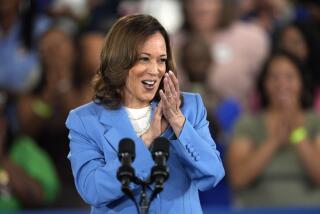Trying to Keep an Edge as Primary Run Steepens
- Share via
WASHINGTON — Can Al Gore stir the Starbucks set? Can John McCain reach a truce with the right? Can John Sweeney, president of the AFL-CIO, and John Engler, Republican governor of Michigan, deliver?
After a full year of skirmishing, the presidential contests in both parties explode into a sprint this month, with the first voters casting their ballots in Iowa two weeks from Monday. And the results are likely to turn on the answers to a handful of key questions like these.
In every contested nomination since 1980, the front-runner has ultimately won each party’s nod,except in 1988, when Democratic leader Gary Hart was forced from the field by scandal.
But this year, the leaders in both the Republican and Democratic races--though the undisputed choice of their party establishments--face an unexpectedly strong challenge from a rival positioning himself as an outsider and reformer.
Among Republicans, Texas Gov. George W. Bush retains towering advantages in money, endorsements and the national polls--but confronts the risk that a McCainvictory in New Hampshire could catapult the Arizona senator intocontention around the country.
Among the Democrats, Gore’s situation is considerably more tenuous, with former Sen. Bill Bradley of New Jersey matching him virtually dollar for dollar in fund-raising and building an enthusiastic base of support not only in New Hampshire but in other key states, including California.
The candidates now await answers that can come only from the voters, who are poised to take control of the process.
Here’s a look at five crucial questions that should determine the races:
* Can Gore or Bradley raid the other’s turf?
Over the last year, Gore and Bradley have established contrasting bases of support. Gore has consistently polled best with minorities, the high school educated and core Democratic partisans--Chevy and Ford voters, in the vernacular of political consultants. Bradley runs best among independents, college graduates and more affluent voters--people who know the difference between a Saab and a Volvo.
These demographics shape the race’s critical first two contests. In more blue-collar Iowa, Gore leads; in more upscale New Hampshire, Bradley is ahead. An upset in either place could upend the race: If Bradley--who’s making a huge investment of time and money in Iowa--steals the caucuses by broadening his appeal, it could prove a near-fatal blow for Gore. Conversely, if Gore can attract enough upscale voters to win New Hampshire, the former senator’s challenge may quickly collapse.
The more intriguing question may be what happens if neither man can significantly expand into the other’s base. Most analysts believe that would aid Gore, because there are more Chevy than Volvo voters in the party. That’s especially true once the contest turns inland from the East and West coasts toward the South and Midwest in mid-March.
Gore’s problem is that his strongest states are concentrated toward the end of the primary calendar, while states built for Bradley (New York, Minnesota and several in New England) all vote on March 7. To recover from a New Hampshire loss on Feb. 1, the key for Gore would be surviving March 7--and the key to that would be winning California, the day’s biggest prize. “California becomes the place where Gore has to make his stand or Bradley has to have an early knockout punch,” says Democratic pollster Geoff Garin, who is neutral in the race.
* Can McCain go to his right?
In New Hampshire, most polls have shown McCain leading Bush among independent voters and moderate Republicans but facing more difficulty with conservatives. Because New Hampshire’s GOP electorate is generally moderate, McCain can win the state with that profile. But to beat Bush in most places--beginning with contests in South Carolina and Michigan--McCain will have to broaden his appeal to conservatives.
“To maintain his momentum down the road after New Hampshire,” says Whit Ayres, a GOP pollster neutral in the race, “he would have to broaden his base into more traditional Republican constituencies.”
It is clear Bush is determined to make that as difficult as possible. Since mid-December, he has repeatedly positioned himself to McCain’s right. Bush has denounced McCain’s campaign finance reform plan as a threat to the GOP and conservative causes, and stressed that he’s offering a much bigger tax cut than the Arizonan. Bush aides say he’s also likely to step up criticism of McCain for not supporting an increase in defense spending and for not offering a detailed education-reform agenda.
That last argument is aimed less at conservatives than centrists and women--and underscores the challenge facing McCain. While Bush is leading among conservatives, his emphasis on racial inclusion, “compassionate conservatism” and, above all, education gives him a broad appeal. “Having a strong education plank . . . allows us to have a truly coalitional candidacy with moderates and conservatives,” says Karl Rove, Bush’s chief strategist.
McCain aides, pointing to his strongly conservative Senate voting record, insist he is well equipped to rebut Bush’s escalating ideological indictment. But it would make McCain’s task much easier if any of the other GOP candidates--most prominently publisher Steve Forbes--showed more life and peeled away some conservative votes from Bush.
* Can Bush take a punch?
Skeptics assert that Bush is winning because he looks like a winner; dent his aura of invulnerability, they argue, and his support could crumble. To a large extent, McCain’s strategy is built on this theory. His campaign figures that if he can win several states early, he can fatally tar Bush as a loser before the governor can fully bring into play his overwhelming financial and institutional advantages.
Maybe. But as Rove points out, Bush’s average support in national polls of Republican voters has steadily increased since last summer--which means he has more ground to give before anyone can catch him. And, as Ayres says, “Bush is playing above a $60-million net, and that will cushion a lot of falls.” Still, Bush has never faced a political setback of the magnitude that a New Hampshire loss would represent. Until he demonstrates the grit to recover from that, the question will linger.
* Can the institutions deliver?
The back-to-back endorsements of Bush by Elizabeth Hanford Dole on Tuesday and Gore by Sen. Edward M. Kennedy (D-Mass.) on Wednesday underscored the investment each party’s establishment has in its front-runner. The next two months will determine whether that support translates into large numbers of votes.
Bush is backed by majorities of Republicans in the Senate and the House, and by 25 of the other 29 GOP governors. If McCain breaks through in New Hampshire, Bush will be heavily counting on this institutional support to stem the tide in South Carolina (where, although the governor is a Democrat, Bush enjoys the backing of virtually all the other key state officials), Michigan (where Engler is leading Bush’s campaign) and Virginia (where Gov. James S. Gilmore is spearheading the effort).
Likewise, on the Democratic side, if Bradley wins New Hampshire, Gore will be counting heavily on California Gov. Gray Davis, who’s directing the vice president’s effort in the state. Also on the spot will be Sweeney, the AFL-CIO president. Labor has launched an aggressive effort to turn out its members for Gore in Iowa and is planning full-court presses in Ohio, New York and California--the three largest prizes on March 7.
* Will money talk?
With improved fund-raising late last year and an infusion of federal matching funds, McCain’s camp says it has entered January with $7.7 million to spend. Bush began the year with $31 million in the bank. McCain has spent competitively in New Hampshire and South Carolina, but Bush’s enormous lead in resources could give him a huge advantage as the race broadens across the country. For instance, McCain last week launched what he said would be a $1-million advertising drive in Michigan; Bush through Jan. 5 had already spent more than $820,000 in the state’s three largest markets, according to the Campaign Media Analysis Group, which tracks political advertising.
Bush aides also say they will remain on the air through the Feb. 22 primary dates in both Michigan and Arizona (where Bush has already poured about $390,000 into Phoenix television, according to the media analysis group). And the Bush aides say they soon will launch ad buys in Washington state and Virginia--whose Feb. 29 contests could provide critical momentum for the March 7 showdowns.
Both Democratic candidates say they will have about $19 million in cash and matching funds. But with his leaner overhead, Bradley appears to have more money to spend on television; even Gore aides admit the challenger is likely to outspend the vice president in Iowa and New Hampshire. Gore aides hint they are saving money for the possibly decisive showdown in California, but one operative watching the trends for a GOP contender believes Bradley may be managing his funds better. Even so, neither candidate may have enough cash left after expenses in Iowa and New Hampshire to make money the decisive factor in their struggle.
More to Read
Get the L.A. Times Politics newsletter
Deeply reported insights into legislation, politics and policy from Sacramento, Washington and beyond. In your inbox twice per week.
You may occasionally receive promotional content from the Los Angeles Times.










